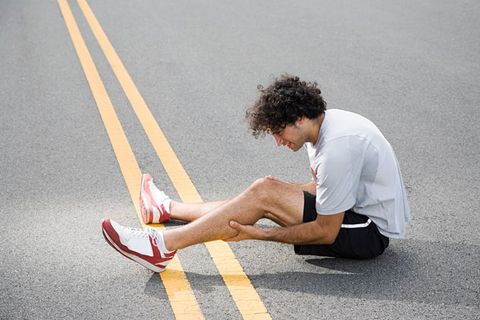
Top 5 Running Mistakes and How To Fix Them
By Bertie in EtchRock
Doing Too Much/Going Too Far, Too Soon

The world of running is a difficult one to compare to other sports. The vast number of people who take part in running means that many people expect to be better when they first start out. This is the first and usually the most common running mistake.
Most people go too hard and too far to start with. Understanding your limits early on can massively reduce the risk of injury, meaning you’ll be able to continue your training and development in the long run.
Running is a sport that needs to be taken slowly to start with. Rome wasn’t built in a day! Start slow, gradually build on your fitness, avoid injury, and really enjoy your training.
Not Wearing the Right Gear and/or Suitable Clothing
With how popular running is, there is hardly a lack of equipment and clothing you can buy that ‘claim’ to improve your running experience. Choosing the right equipment is vital to keeping yourself comfortable with your running and safe from injury.
If you wear the wrong shoes, you’ll quickly notice that it affects you negatively. If you carry on with the wrong shoes/trainers, it can lead to severe injury, and nobody wants that! Trainers are arguably the most crucial equipment piece, and for a good reason. Here is a good place to start when looking for a decent pair of trainers.
Suitable clothing is important, but so is knowing when to wear what. Having lightweight clothing is always a brilliant idea, and if you live in the UK, make sure it’s waterproof too! Running in uncomfortable and unsuitable clothing can completely ruin your running experience and put you off doing it at all.

Remember that you’ll warm up once you get going on your run!
Good gear = good running.
Diet and Hydration
Something that a lot of beginner runners neglect is diet and hydration. If you don’t have the correct diet, you’ll see yourself not training at optimum levels, which will impact your development. Keeping your diet varied but full of energy-filled food is essential to your training plan. Bananas, peanut butter and broccoli, to name just a few. Have these in your diet in large quantities, and you will reap the rewards of what they can give.
Drinking water is important in general life, and even more so if you have a busy running schedule. Being dehydrated can cause a loss of concentration and not to mention headaches! Hydrating properly will improve your running performance tenfold and allow for your running to not impact your personal life negatively.
Breathing

Breathing might seem like an odd one, as we all know how to do it, even when we run. But that is where a lot of people are mistaken. Breathing is essential, and when you’re doing it wrong, it can really show.
Fear not; there are some tricks of the trade that can help. One method is running at a conversational pace. To find your right pace, only run at a speed where sentences don’t cause you to be overly breathless. Once you’ve found your pace, you can start to work on breathing techniques that can improve your speed and make running further distances easier.
There are specific techniques that runners can learn that will help. One is breathing through the nose and the mouth. Utilising both inhalation methods simultaneously and increasing your oxygen intake, feeding it to your muscles quicker will allow for further distances to be conquered quicker.
Another technique is breathing from your diaphragm. This is not as easy as it sounds, and many beginners breathe from their chests. Using the powerful muscle will allow for more intake and expulsion, meaning more oxygen and less carbon dioxide. Breathe from the belly and get as much air in as possible!
Overtraining
Once you’re on your way when it comes to your training, and the other mistakes are no longer a part of your running life, you can become a victim of overtraining. This is a mistake that even some top athletes are guilty of doing every now and then.
Once a runner gets into the swing of it, and they can see themselves smashing their targets and improving every run, they will be tempted to push even further. This can be one of the worst things you can do. Overtraining can lead to burning out, which means a complete cut in your training or even falling out of love with the hobby.
The best tip to stop this from happening is to plan your training regime far enough into the future. Look months ahead, plan accordingly with overtraining in mind, and you won’t find yourself getting to the stage where you are overtraining.
Another thing to remember is there is no harm in a rest day or two! These can benefit your mind and body equally, minimise injury and stop you overtraining.